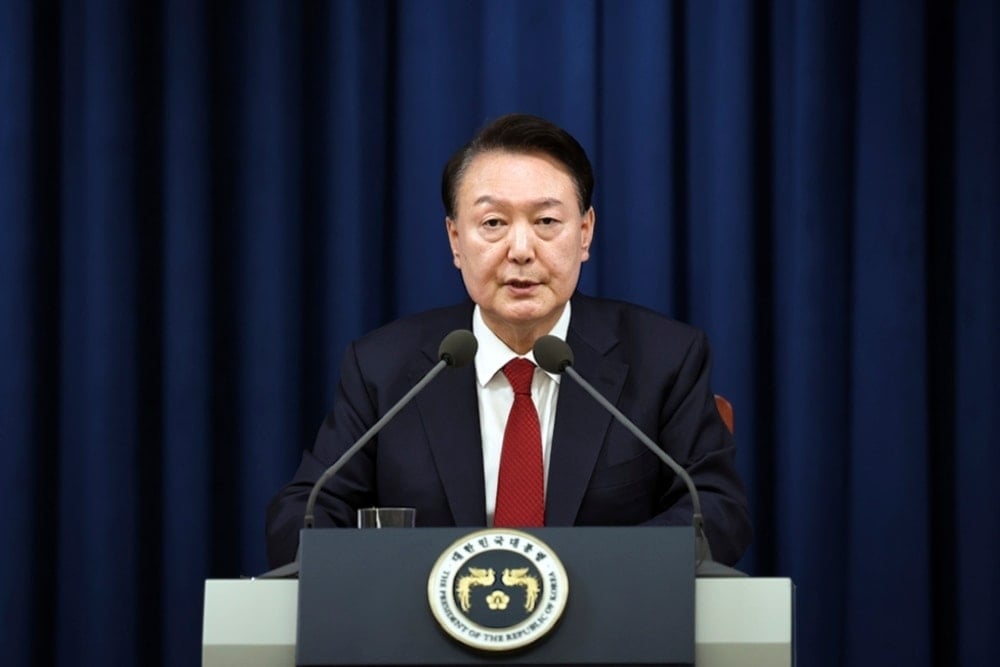South Korean court issues arrest warrant for suspended President Yoon
The conservative leader faces criminal charges of insurrection, which could result in life imprisonment or even the death penalty.
-

South Korean President Yoon Suk Yeol speaks during a press briefing at the presidential office in Seoul, South Korea, on Tuesday, December 3, 2024. (AP)
A South Korean court approved on Tuesday the arrest of President Yoon Suk Yeol, who had been impeached by parliament and temporarily suspended from office for imposing martial law.
This decision represents a historic moment, as it is the first time in South Korea's history that a sitting president has faced an arrest warrant.
The Corruption Investigation Office for High-ranking Officials (CIO) confirmed that the Seoul Western District Court authorized the arrest warrant, which was sought by investigators probing Yoon's brief declaration of martial law.
Driving the news
Yoon is under investigation for allegedly leading an insurrection, one of the few criminal charges that can be brought against a South Korean president, as they do not enjoy immunity from such accusations. Additionally, his impeachment trial is ongoing at the Constitutional Court.
The issuance of an arrest warrant for a sitting president is unprecedented in South Korea and further intensifies the political crisis in the country, which is a key US ally in Asia.
The conservative leader faces criminal charges of insurrection, which could result in life imprisonment or even the death penalty.
Investigators probing Yoon over his declaration of martial law requested the warrant Monday after the suspended president failed to report for questioning a third time.
Prime Minister Han Duck-soo, who assumed the role of acting president after Yoon, has also been impeached by the opposition-dominated parliament for failing to sign bills for investigations into Yoon.
Following Han's impeachment, Finance Minister Choi Sang-mok took over as acting president. He is currently managing the aftermath of the tragic crash of Jeju Air flight 7C2216 on Sunday, which resulted in 179 deaths, marking the deadliest air disaster in South Korean history.
Dive deeper
A CIO official told reporters at a briefing on Tuesday that the current arrest warrant for Yoon is valid until January 6, adding that Yoon could be held at a police station or the Seoul detention center.
"The reason for the warrant is that there is a concern that the individual may refuse to comply with summons without justifiable reasons, and there is sufficient probable cause to suspect the commission of a crime," the official explained.
Yoon Kab-keun, a lawyer for the impeached president, argued that the arrest warrant was "illegal and invalid" because the CIO lacked the legal authority to request it. Yoon's legal team plans to seek an injunction from the Constitutional Court to block the warrant.
While the court has not provided further comments, it has also approved a search warrant for Yoon's residence. Earlier attempts by the police to raid the presidential office were unsuccessful due to obstruction by the presidential security service.
Even though the warrant has been issued, it is unclear whether investigators and police will be able to execute it. The Presidential Security Service has previously refused to comply with three search warrants.
It said Tuesday that "security measures regarding the execution of the warrant will be carried out in accordance with lawful procedures," in a statement to local media.
Police were stationed early Tuesday outside Yoon's residence in central Seoul, likely aiming to prevent potential clashes.
Both Yoon's supporters and protesters demanding his removal have gathered outside his residence, with local media publishing images of confrontations between the two groups overnight.
"Up to 3,000 people will move to protest against the unfair and invalid arrest warrant," stated an official from the largest pro-Yoon protest group.
According to local media, an immediate arrest or search of the presidential residence is considered unlikely, as investigators are expected to coordinate with the presidential security service.
Yoon allegedly authorized the military to use weapons if necessary
Yoon is under investigation by prosecutors, as well as a joint task force comprising police, defense ministry, and anti-corruption officials.
A 10-page report by prosecutors, reviewed by AFP, alleges that Yoon authorized the military to use weapons if necessary to gain access to parliament during his failed attempt to impose martial law.
Yoon’s lawyer previously dismissed the report, describing it to AFP as "a one-sided account that neither corresponds to objective circumstances nor common sense."
On December 3, Yoon unexpectedly declared martial law in a televised address, claiming it was intended to eliminate "anti-state elements."
Lawmakers rushed to parliament within minutes of the announcement and swiftly voted to reject it. Simultaneously, heavily armed troops stormed the parliament building, scaling fences, breaking windows, and descending from helicopters.
The prosecution’s indictment report states that Yoon instructed the head of the capital defense command, Lee Jin-woo, to use force, including live fire if necessary, to enter the National Assembly.
The report further claims there is evidence Yoon had been discussing the possibility of declaring martial law with senior military officials as early as March.
Read next: S. Korea ex-Def. Min. attempts suicide, Pres. vows to 'fight to end'

 5 Min Read
5 Min Read








